On the evening of October 1st, National Day and the start of a week-long holiday, Nanchang was celebrating with a spectacular fireworks/drone show, drawing an enormous crowd of people (see video).
But the fireworks weren’t the only thing drawing attention. One man on Nanchang’s crowded Shimao Road caught bystanders’ eyes.
He was shirtless, strongly built with a visible tattoo, and was waving a pointed object while loudly shouting something that sounded like, “I’ll kill you! I’ll kill you!”
At first, the people around him seemed unsure of what to do, keeping their distance and too afraid to approach. A large crowd formed but stayed back.
Then, a brave young man in red rushed forward and snatched the pointed object from his hand, while another young man leapt in with a flying kick that knocked him to the ground.
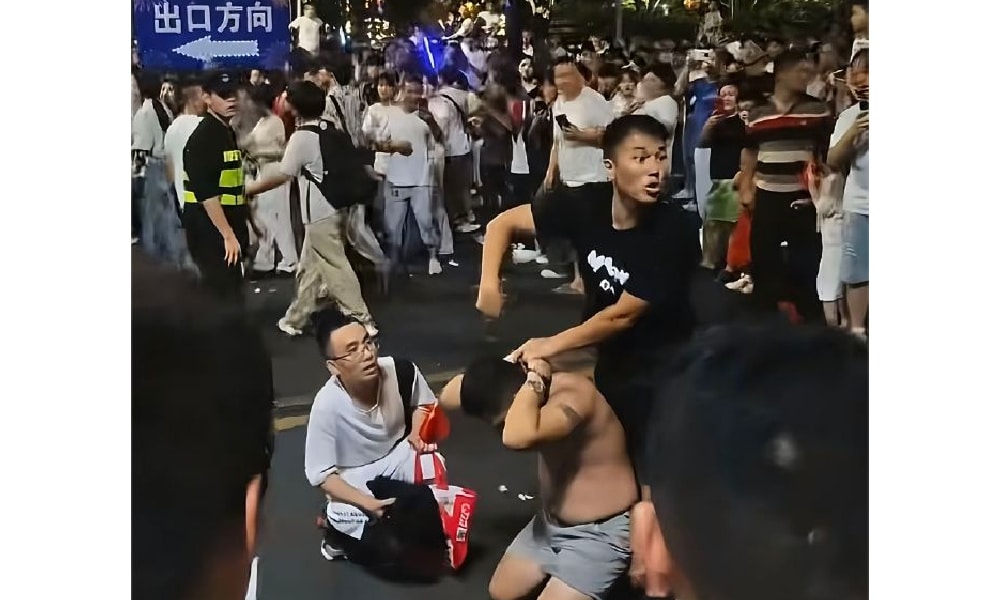
Several others then joined in, working together to restrain the man, as onlookers surrounded the scene and held him there until police arrived and took him to the station.
Soon, videos of the incident spread online (see video here), and rumors quickly surfaced that the man had been trying to attack people with a knife.
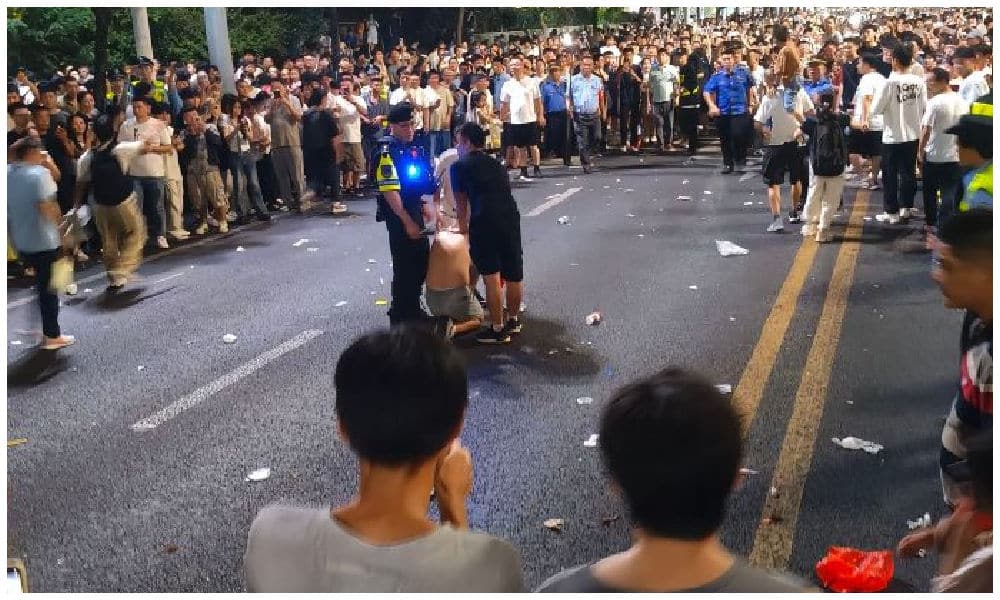
But that all turned out to be one major misunderstanding.
The next day, local police clarified what had actually happened, followed by an explanation from the man himself.
The man in question, a 31-year-old local second-hand car dealer named Li, had come to see the fireworks together with his family, including his sisters and three nephews.
Because of the very hot weather, he had taken off his shirt and was cooling himself with a 10-yuan folding fan he had just bought along the way.
After the show, while walking back, Li realized one of his nephews was missing and searched for him, calling out in his local dialect: “Where’s my kid? Where’s my kid?” (“我崽尼 我崽尼” wǒ zǎi ní).
Bystanders misheard this as “我宰你 我宰你” (wǒ zǎi nǐ, wǒ zǎi nǐ, “I’ll kill you, I’ll kill you”) and mistook his folding fan for a machete.
Meanwhile, Li couldn’t understand why people around him were avoiding him and keeping their distance from him while he was searching for his nephew (see that moment here, also see more footage here). People were watching him, and recording the scene from a distance.
Before Li realized what was happening, the fan was snatched from his hands and he was violently kicked. A crowd swarmed him, beat him, and pushed him to the ground.
The police then detained him, and it wasn’t until the early hours of October 2, after thorough questioning, that he was finally released.
“I’m still confused about it,” Li said the next day. Holding the fan up to the camera, he asked: “Can a fan like this really scare people? I don’t understand — I just got beaten for nothing.”
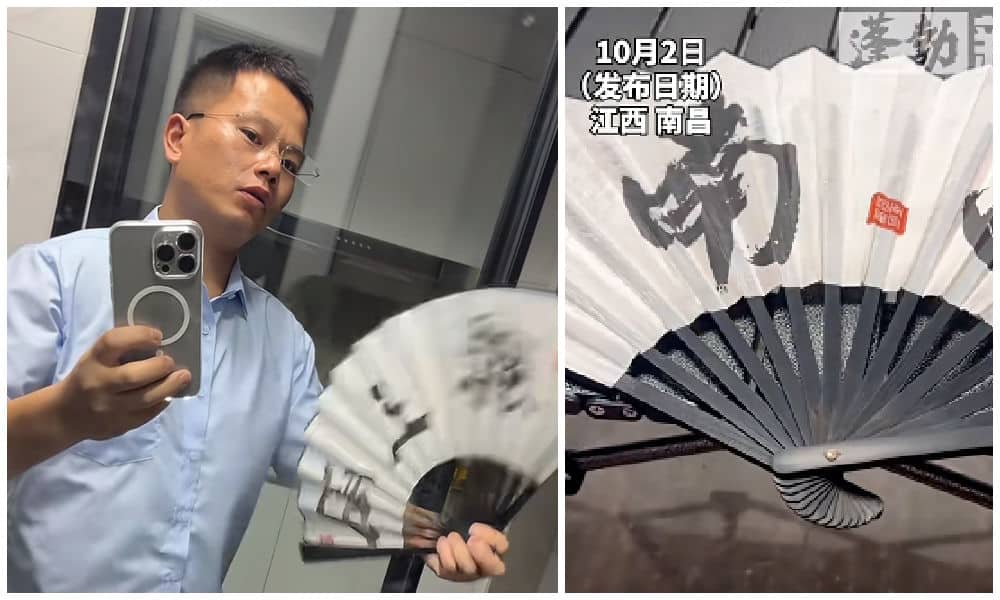
Mr Li in his video, showing the fan he bought for 10RMB/$1.4 at the Nanchang fireworks.
Some commenters remarked that out of the 1.2 million people who were out in Nanchang that night, he was the only one injured.
Li seems to be doing ok apart from a sore backside and a puzzled mind, and his nephew apparently is also safe and well.
The bizarre misunderstanding has sparked widespread banter online, with people now referring to Li as “Nanchang Brother Fan” (南昌扇子哥).
“I’m dying of laughter. It’s both tragic and hilarious,” one Douyin user wrote, while others simply called the situation “so drama” (抓马 zhuāmǎ): “I’m not supposed to laugh, but I can’t help it.”
Some also noted that they understood why people at the scene mistook Li for a criminal: “At night, a guy with tattoos, holding a long stick-like object, shouting loudly all the way, what would you think?”
All joking aside, the public’s response on such a crowded night — when so many people gathered together, potentially making a tempting target for those with bad intentions — shows a heightened sense of vigilance. Unlike the U.S., where gun violence is more common, shootings are rare in China. But random stabbings have increasingly made headlines.
For Nanchang in particular, a stabbing incident that shocked the nation had taken place only weeks earlier: a 19-year-old woman was attacked and stabbed more than ten times by a 23-year-old man she did not know, and later died from her injuries.
But there have also been other recent cases, from Wuhan to Leiyang. And in 2024 especially, a spate of stabbing incidents shocked the country. In Wuxi, Jiangsu Province, a mass stabbing left eight people dead and 17 others injured.
The positive takeaway from this entire mix-up is that the quick action of the crowd — despite their wrong assessment of the situation — shows that people weren’t afraid to step in for the sake of public safety.
But others claim the exact opposite is true. Illustrator and commentator ‘Wu Zhiru’ (吴之如), former editor at Zhenjiang Daily, saw the incident as an example of toxic herd mentality. He posted an illustration of a fan being held up with the characters 清风徐来 (qīng fēng xú lái, “a cool breeze slowly blows”), an idiom to describe a pleasant atmosphere. A finger from the right points at the fan-holder, saying “Look, he’s gonna commit violence!” (“哇,他要行凶啦!”)

Wu Zhiru warns against panic-driven mob mentality and wonders why the first man, who snatched the “knife” from Li’s hands, did not stop the crowd from attacking Li as soon as he discovered that he had snatched away a fan and not a blade. Drawing historical parallels to the Cultural Revolution, Wu argues that people are sometimes so set on doing the “heroic” thing that they hesitate to correct misunderstandings once better information is available — a mindset that can lead to serious, harmful consequences.
For Li himself, despite the unfortunate night he had, the situation has actually brought him some unexpected fame and extra attention for his second-hand car dealership, which undoubtedly makes his boss happy (in a very recent livestream, Li was praised for being kind and loyal).
Many netizens also argued that the real lesson to draw from this ordeal is the importance of speaking proper standard Chinese. Some even framed the incident as “The Importance of Mandarin” (论普通话的重要性), pointing out that the whole problem began because Li was misunderstood while speaking dialect.

Image posted on Weibo in support of the “fan-waving brother.” The character on the fan says “tolerate.”
Others joked that the misunderstanding was just a grave injustice to shirtless men everywhere, writing: “From now on, the world has one less sincere guy who goes shirtless in the streets. He’ll never be the same again.”
By Manya Koetse
(follow on X, LinkedIn, or Instagram)
Spotted a mistake or want to add something? Please let us know in comments below or email us. First-time commenters, please be patient – we will have to manually approve your comment before it appears.
©2025 Whatsonweibo. All rights reserved. Do not reproduce our content without permission – you can contact us at info@whatsonweibo.com.


 China Memes & Viral3 months ago
China Memes & Viral3 months ago
 China Books & Literature12 months ago
China Books & Literature12 months ago
 China Insight5 months ago
China Insight5 months ago
 China Memes & Viral10 months ago
China Memes & Viral10 months ago
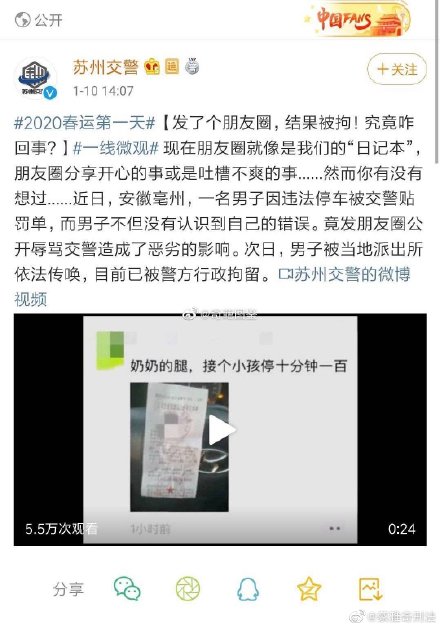

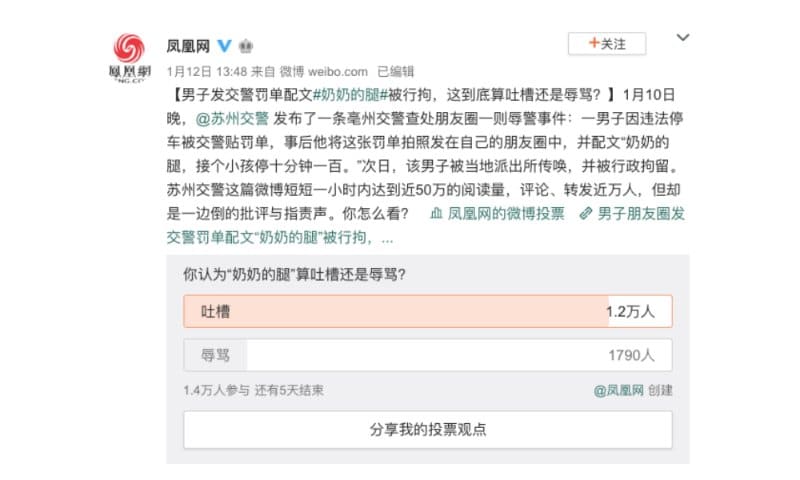






















John Wang
February 6, 2020 at 10:48 am
it is always like this on wechat haha… post appear then delete;.. then all my friends repost and say, it will be deleted soon, you have to read, so i read and reshare with same messages.
If you say it will be deleted soon, most people will click and read… haha.